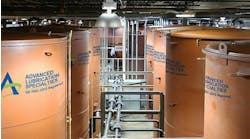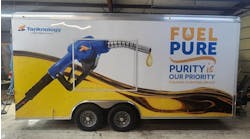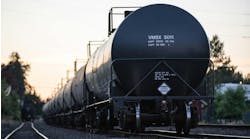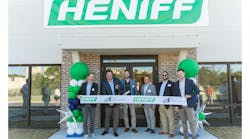Brenntag North America crafts successful strategy to safely, efficiently deliver bulk quantities of DEF
Who could have predicted when Philipp Mühsam founded a small egg wholesale business in 1874 in Berlin, Germany, the company would eventually grow to become the world leader in full-line chemical distribution? But ever since Mühsam’s company changed its name to Brenntag and entered into the chemical-distribution business, that’s exactly what happened.
After moving its headquarters in 1943 to the German city of Mülheim an der Ruhr, known as the “City on the River” near Germany’s border with The Netherlands, Brenntag went into expansion mode and successfully increased its warehousing network through acquisitions while adding to its product line, including the addition of inorganic and organic chemicals, solvents, plastics, resins, and specialty chemicals.
Expansion within Germany continued throughout the 1950s and 1960s, with Brenntag eventually hitting the world stage as a multinational company with the acquisition of the Belgium-based Balder in 1966. Brenntag has continued to expand globally, and currently has a global network of more than 530 locations in 74 countries, offers more than 10,000 products, employs more than 14,000 and serves more than 150,000 customers worldwide. The company realized global sales of €10.3 billion (US $11.5 billion) in 2015.
As part of the Brenntag Group, Brenntag North America, Inc, headquartered in Reading, Pennsylvania, is responsible for providing business-to-business distribution as well as sales and marketing solutions for industrial and specialty chemicals throughout the United States and Canada. This responsibility includes managing complex supply chains for both chemical manufacturers and consumers and then streamlining processes to provide market access to thousands of products and services. Or to put it simply, the company connects chemical manufacturers to chemical users.
One of the chemicals Brenntag North America is responsible for delivering to the market is diesel exhaust fluid (DEF). DEF is a non-toxic, high-purity solution comprised of 32.5% urea and 67.5% de-ionized water. Using this fluid in diesel-powered vehicles, such as trucks, buses, and tractors, helps to reduce the amount of nitrogen oxides (NOx) emitted into the air by 90%.
“We started delivering DEF in the United States in 2009,” says Alan Smith, DEF business director for Brenntag North America. “Since then, we have made significant investments in DEF-dedicated terminals and delivery assets across the United States and Canada. We have more than 25 dedicated DEF tankers and around 31 DEF rail locations in the United States. These assets make us unique in the DEF space. We have a broad global network with outstanding local execution, allowing us to supply a wide variety of customers, including fleets, distributors, OEMs, and truck stops.”
Keeping clean
Delivering DEF can be challenging, and must be handled by equipment and transports designed specifically for hauling that product. DEF is incompatible with materials such as copper and brass, and can lead to corrosion of these materials. This means that any transport used to haul DEF, as well as all of its wetted components, needs to be made of stainless steel or approved plastics such as high-density polyethylene (HDPE). This ensures fluid won’t become contaminated by trace quantities of metals during handling and transfer.
By extension, the product pumps needed during the DEF production process, or those that are required to load DEF onto a transport and off again into a storage tank, must also be compatible with DEF’s unique characteristics.
“The main consideration when choosing a pump for a DEF application is the materials of construction,” says Matthew Sparrow, a DEF mechanical engineer for Brenntag North America. “All materials that come in direct contact with DEF must be compatible to avoid any contamination of the fluid. To ensure that all of our equipment is compatible, we follow ISO 22241-3 standards, which describe best practice recommendations and requirements for the handling, transporting and storage of DEF.”
While the contamination of DEF can occur during the manufacturing and packaging process, it is more likely to occur during transfer or in storage. Therefore, companies responsible for the transportation of DEF must take extra precautions and safeguard themselves against these occurrences. If contaminated DEF is delivered, and then the same DEF is used in a vehicle, the results can be very costly for all parties involved. Not only does contaminated DEF damage the reputation of the delivery company, but it also can significantly damage a vehicle’s selective catalytic reduction (SCR) system.
“It is essential to deliver clean, non-contaminated DEF fluid to customers,” says Smith. “Vehicles using contaminated DEF are in danger of suffering severe damage to their SCR system. A majority of issues encountered stem from material-of-construction issues: either the wrong materials are selected or materials not on the recommended list were not properly tested by a third-party lab.”
Downtime and leakage are additional issues. When DEF dries a white crust will appear. This residue can create havoc on the internal pump components, connectors, seals, and anything else that comes in contact with the fluid. Improper design can cause the equipment to lock up or leak, resulting in costly downtime or a messy clean up.
Right solution
When it came time to select a transport pump capable of interacting positively with DEF during the loading and unloading process, Brenntag North America turned to STX-DEF Series Sliding Vane Pumps from Blackmer.
“We use STX-DEF pumps from Blackmer at our terminals to unload railcars, transfer product from one storage tank to another, and to load and unload tank trucks,” Sparrow says. “With the addition of either a bypass line or VFD (variable frequency drive), the STX-DEF pump can also be used to fill drums and totes. In addition, we use Blackmer pumps on our internal DEF tanker fleet to fill customers’ drums, totes, and mini-bulk tanks. These pumps are the ideal solution for applications with long runs of piping, when suction hoses and piping need to be stripped dry, or when precise flow rates are desired.”
STX-DEF pumps from Blackmer feature 316 stainless-steel construction with external ball bearings, chemical-duty mechanical seals, PTFE elastomers, and non-metallic vanes, making them the ideal choice to handle DEF. These features allow STX-DEF pumps to meet the ISO 22241-3 material standards and cleanliness specifications required for DEF-handling applications.
Specifically, Brenntag North America utilizes Blackmer STX3-DEF, STX1220A-DEF and STX2ADEF pump models for its operation. STX3-DEF models offer high-capacity flow rates up to 250 gpm (946 L/min), and pump speeds up to 800 rpm for delivering fast fluid offloading. In fact, a 6,000-gallon (22,700-liter) tanker can be unloaded in about 24 minutes using the STX3-DEF pump. Designed for relatively high flow rates, STX1220A-DEF models feature flow rates from 42-92 gpm (159-348 L/min), while the STX2A-DEF models are ideal for lower flow rates generally in the 15-60 gpm (57-227 L/min) range.
The STX-DEF Series pump’s non-metallic vanes also self-adjust for wear in order to maintain flow rate, while minimizing shear and agitation. An adjustable relief valve protects the pump from excessive pressures. The pump has excellent self-priming and dry-run capabilities and maintenance is reduced because internal wear is almost completely limited to the easily replaced sliding vanes, which can be accomplished without needing to take the pump out of line.
“Blackmer DEF pumps have an excellent service record. Our facilities have reported less downtime and repair work since installing Blackmer pumps,” says Sparrow. “The wetted components have long service life, and the housings, gearboxes, motors, and frames hold up well in indoor and outdoor applications. Only a handful of pumps have ever needed repairs over the last five years, and thanks to their excellent design, repairs are typically completed in a day or less depending on the availability of parts.”








